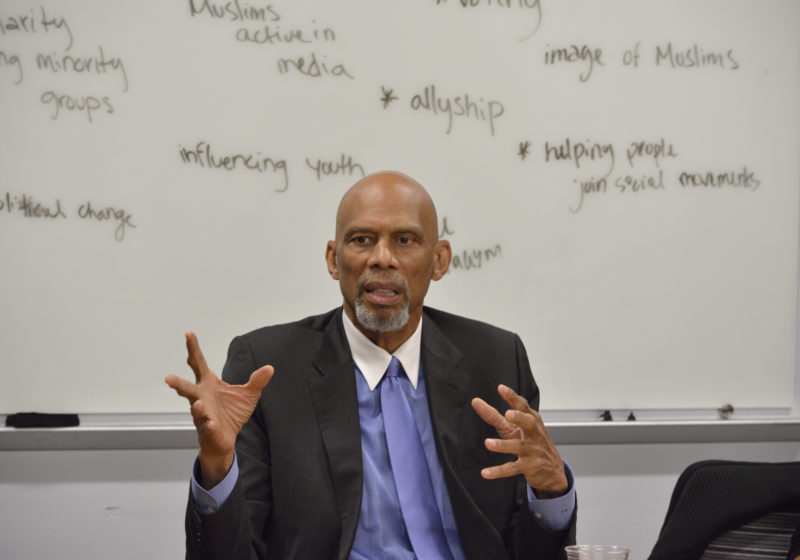Prior to his Monday event, “Writings on the Wall: Searching for a New Equality Beyond Black & White,” Kareem Abdul-Jabbar sat down with the Campus Times for an exclusive interview. The interview built on the questions Abdul-Jabbar answered via email last week.
We also attended a press conference for local media and a student roundtable relating to social issues in sports, politics, and media.
Abdul-Jabbar is an NBA all-time greats, playing for over two decades and revolutionizing the center position.
Always an outspoken advocate for social justice and equality, Abdul-Jabbar became an activist after leaving the game.
He struck us as calm, deliberate, honest, engaging, and gracious.
Abdul-Jabbar showed his support for Colin Kaepernick. “He persisted — he was consistent, he did not lose his class or his temper, he kept the pressure on,” Abdul-Jabbar said about Kaepernick’s methods during his ongoing protest and activism regarding police brutality against people of color.
He added that he “was really glad to see that Nike chose to support [Kaepernick]” and that it was important that “corporate America came down on the right side of the issue.”
He strongly believes that sports are a political matter, often mentioning Jesse Owens at the 1936 Berlin Olympics. But Abdul-Jabbar said that sports are only partisan “recently because the president resents the fact that Colin Kaepernick drew a lot of attention to an issue that the president didn’t want to see discussed.”
Regarding visits to the White House by championship sports teams, Abdul-Jabbar said that he believes that the current climate where athletes are outspoken about their political beliefs was created by President Trump — specifically due to Trump’s “bigotry and the fact that he lies all the time.”
“Anyone that rules in a way that tears us apart is being counterproductive,” Abdul-Jabbar said about Trump’s divisive and bigoted rhetoric.
We discussed the issue of arming Public Safety officers with Abdul-Jabbar. He pointed out how studies have shown that racist officers are “able to adjust and be good officers even though they might still hold on to their racist views; they can still treat people fairly.” Additionally, he argued that the issue is whether or not officers can treat people fairly under the law, not whether or not they like specific ethnic groups.
Abdul-Jabbar converted to Islam in the 60’s, so we asked him about the treatment of Muslim Americans over time. He said that for a while, Muslims were “under the radar” in America and lived without problems. “In the 90’s, they started with the radical people from the Middle East coming to our country to attack us, and that’s when Muslims became a problem in the minds of the average American.”
He said he understands why Americans would fear people coming from another place to attack them, but stated that “discriminating against and persecuting American Muslims is not going to solve the problem.” He continued that the problem begins in the Middle East where people “have no hope for anything, they can’t get an education, they can’t get a job, they can’t get out of the country, they’re stuck, and that anger boiled over.”
We then shifted to Abdul-Jabbar’s acting role in “Airplane!” Specifically, we asked about how certain parts of the film can now be seen as politically incorrect. In one scene, for example, the white protagonist joins the Peace Corps and visits an unnamed African nation. He begins teaching the black natives the fundamentals of basketball, and within a minute they are swishing all their shots and performing elaborate dunks.
“Those things were our attempt to satirize the way that black people were depicted; we weren’t trying to indulge in it, we were trying to satirize it,” Abdul-Jabbar responded.
Lastly, he said that receiving the Presidential Medal of Freedom from Barack Obama in 2016 validated his career. “People didn’t appreciate my stance on things, and now the people have seen that maybe I might have been on the right side, and that makes me feel good.”





